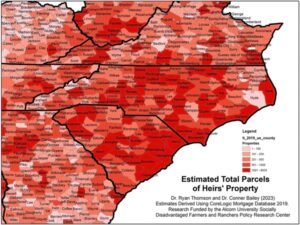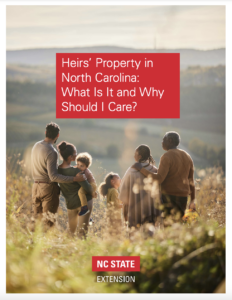Heirs’ Property in North Carolina: What Is It and Why Should I Care?
go.ncsu.edu/readext?1067787
en Español / em Português
El inglés es el idioma de control de esta página. En la medida en que haya algún conflicto entre la traducción al inglés y la traducción, el inglés prevalece.
Al hacer clic en el enlace de traducción se activa un servicio de traducción gratuito para convertir la página al español. Al igual que con cualquier traducción por Internet, la conversión no es sensible al contexto y puede que no traduzca el texto en su significado original. NC State Extension no garantiza la exactitud del texto traducido. Por favor, tenga en cuenta que algunas aplicaciones y/o servicios pueden no funcionar como se espera cuando se traducen.
Português
Inglês é o idioma de controle desta página. Na medida que haja algum conflito entre o texto original em Inglês e a tradução, o Inglês prevalece.
Ao clicar no link de tradução, um serviço gratuito de tradução será ativado para converter a página para o Português. Como em qualquer tradução pela internet, a conversão não é sensivel ao contexto e pode não ocorrer a tradução para o significado orginal. O serviço de Extensão da Carolina do Norte (NC State Extension) não garante a exatidão do texto traduzido. Por favor, observe que algumas funções ou serviços podem não funcionar como esperado após a tradução.
English
English is the controlling language of this page. To the extent there is any conflict between the English text and the translation, English controls.
Clicking on the translation link activates a free translation service to convert the page to Spanish. As with any Internet translation, the conversion is not context-sensitive and may not translate the text to its original meaning. NC State Extension does not guarantee the accuracy of the translated text. Please note that some applications and/or services may not function as expected when translated.
Collapse ▲Read our newest publication on heirs’ property – Heirs’ Property in North Carolina: What Is It and Why Should I Care?
Read the full publication: https://content.ces.ncsu.edu/heirs-property-in-north-carolina-what-is-it-and-why-should-i-care
“Heirs’ property is a complicated, vulnerable form of property ownership in which wills are absent and land is passed down informally for generations. This type of ownership has historical roots in the Jim Crow era in the South and is common among rural mountain communities throughout Appalachia where few legal resources were used or available. Heirs’ property continues to be a particularly vexing problem in North Carolina and throughout the South, occurring in rural, suburban, and urban areas. Figure 1 shows that heirs’ property exists in all North Carolina counties and in most counties across neighboring states. Many of these properties are concentrated near the coast, but they are common throughout the state.

Figure 1. As of 2023, 40,000 land parcels in North Carolina were classified as heirs’ property.
New heirs’ property continues to be created, with a concerning number of landowners having no succession plans and leaving property without a will for their heirs. The result has been significant land loss throughout North Carolina, particularly in Black communities. This loss has created an erosion of intergenerational wealth transfer, which has had negative consequences for succeeding generations. In addition to creating challenging family dynamics and a loss of family wealth, North Carolina loses prime agricultural and forestry land due to development and parcel fragmentation. This will have a long-term impact on our strong agriculturally based economy, which contributes over $111 billion to the state’s coffers (North Carolina Department of Agriculture & Consumer Services 2024). North Carolina has also become a prime location for people wanting to relocate to a state with a rural community character and available land. This has led to North Carolina being projected to be second in the nation for agricultural and forest land loss via development by the year 2050 (Hunter et al. 2022). Family property remains an important resource that deserves thoughtful consideration and one that is worth preserving in North Carolina.
Our hope is that this publication will begin to move the needle for landowners to engage families in meaningful succession and estate planning and to take the necessary legal steps to ensure the wise transfer of assets to succeeding generations.”

Read the full publication (https://content.ces.ncsu.edu/heirs-property-in-north-carolina-what-is-it-and-why-should-i-care) written by:
Kurt Smith
Assistant Professor of Forestry and Environmental Resources
Forestry and Environmental Resources
Ryan Thomson
Associate Professor
Rural Sociology, Auburn University
Portia Johnson
Extension Specialist and Assistant Professor
Human Sciences, Auburn University
Adam Rabinowitz
Extension Specialist and Associate Professor
Agricultural Economics, Auburn University
Katie Keown
Visiting Professor
Agriculture Law, Auburn University
A PDF version is also available for download and printing.


